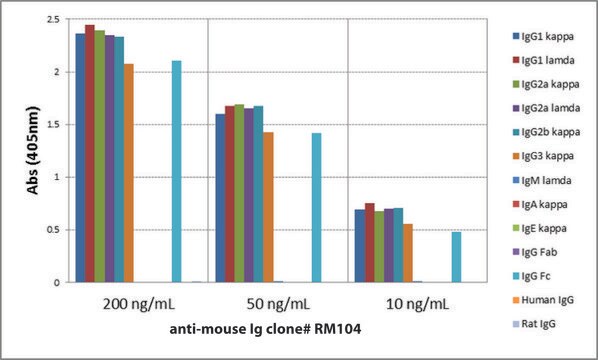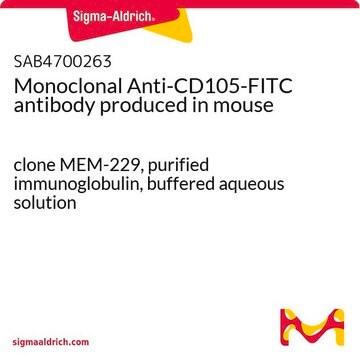18-161
Protein G, HRP conjugate
500 µg Protein G, HRP conjugate for Dot Blot, ELISA, Western Blotting & IHC.
Synonym(s):
Protein G HRP
Sign Into View Organizational & Contract Pricing
All Photos(1)
About This Item
UNSPSC Code:
41105332
eCl@ss:
32160405
NACRES:
NB.22
Recommended Products
form
solid
manufacturer/tradename
Upstate®
technique(s)
ELISA: suitable
dot blot: suitable
immunohistochemistry: suitable
western blot: suitable
shipped in
wet ice
Application
Suitable for immunoblotting (western or dot blot), ELISA, immunoperoxidase electron microscopy, and immunohistochemistry.
Quality
Suitable for immunoblotting (western or dot blot), ELISA, immunoperoxidase electron microscopy, and immunohistochemistry
Physical form
chromatographically pure Protein G conjugated to horseradish peroxidase lyophilized from 0.02 M Potassium Phosphate, 0.15 M NaCl, pH 7.2, 10 mg/ml BSA.
Storage and Stability
Lyophilized: Stable for 2 years at -20°C from date of shipment. Rehydrated: Stable for 6 months at -20°C
Legal Information
UPSTATE is a registered trademark of Merck KGaA, Darmstadt, Germany
Disclaimer
Unless otherwise stated in our catalog or other company documentation accompanying the product(s), our products are intended for research use only and are not to be used for any other purpose, which includes but is not limited to, unauthorized commercial uses, in vitro diagnostic uses, ex vivo or in vivo therapeutic uses or any type of consumption or application to humans or animals.
Storage Class Code
11 - Combustible Solids
WGK
WGK 3
Certificates of Analysis (COA)
Search for Certificates of Analysis (COA) by entering the products Lot/Batch Number. Lot and Batch Numbers can be found on a product’s label following the words ‘Lot’ or ‘Batch’.
Already Own This Product?
Find documentation for the products that you have recently purchased in the Document Library.
Ryan J H West et al.
Human molecular genetics, 27(8), 1382-1395 (2018-02-13)
Frontotemporal dementia (FTD) is one of the most prevalent forms of early-onset dementia. However, the pathological mechanisms driving neuronal atrophy in FTD remain poorly understood. Here we identify a conserved role for the novel pro-apoptotic protein plenty of SH3s (POSH)/SH3
Natalia Sanchez de Groot et al.
Molecular systems biology, 15(4), e8075-e8075 (2019-04-10)
Phase separation of soluble proteins into insoluble deposits is associated with numerous diseases. However, protein deposits can also function as membrane-less compartments for many cellular processes. What are the fitness costs and benefits of forming such deposits in different conditions?
Ana I Rodriguez-Perez et al.
Age (Dordrecht, Netherlands), 35(5), 1675-1690 (2012-09-19)
The possible interaction between brain hypoperfusion related to aging and/or vascular disease, vascular parkinsonism and Parkinson's disease, as well as the possible contribution of aging-related chronic brain hypoperfusion in the development or severity of Parkinson's disease are largely unknown. We
Ana I Rodriguez-Perez et al.
Molecular neurodegeneration, 6(1), 58-58 (2011-08-19)
There are sex differences in dopaminergic degeneration. Men are approximately two times as likely as premenopausal women of the same age to develop Parkinson's disease (PD). It has been shown that the local renin angiotensin system (RAS) plays a prominent
Lucie Potuckova et al.
Frontiers in immunology, 9, 1771-1771 (2018-08-18)
C-terminal Src kinase (CSK) is a major negative regulator of Src family tyrosine kinases (SFKs) that play critical roles in immunoreceptor signaling. CSK is brought in contiguity to the plasma membrane-bound SFKs via binding to transmembrane adaptor PAG, also known
Our team of scientists has experience in all areas of research including Life Science, Material Science, Chemical Synthesis, Chromatography, Analytical and many others.
Contact Technical Service








